Global Plastics Production affecting Oceans
VerifiedAdded on 2023/01/18
|8
|1573
|55
AI Summary
This article discusses the impact of global plastics production on oceans and the environment. It explores the reasons behind the problem, effects on marine life, and possible solutions to reduce plastic pollution.
Contribute Materials
Your contribution can guide someone’s learning journey. Share your
documents today.
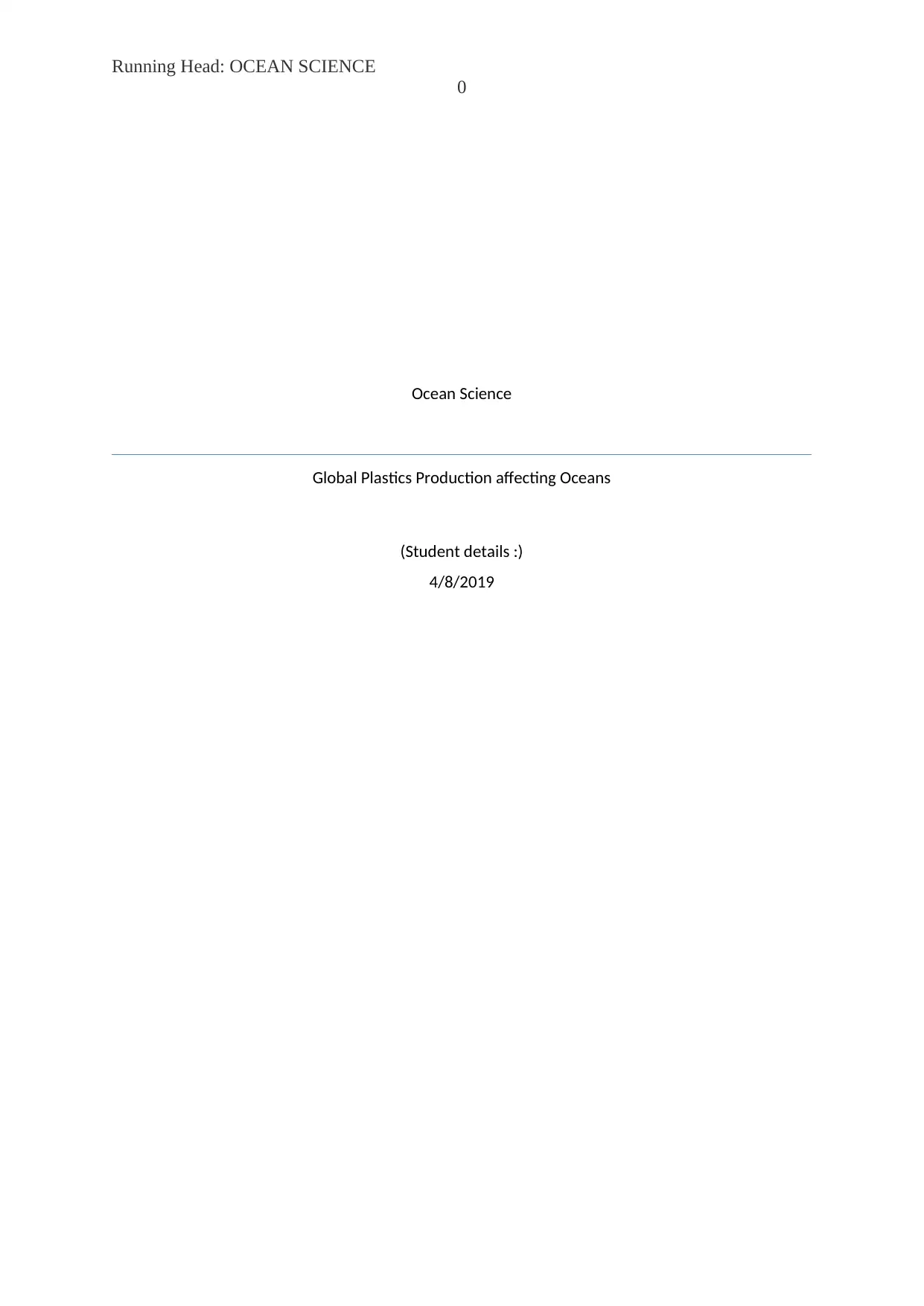
Running Head: OCEAN SCIENCE
0
Ocean Science
Global Plastics Production affecting Oceans
(Student details :)
4/8/2019
0
Ocean Science
Global Plastics Production affecting Oceans
(Student details :)
4/8/2019
Secure Best Marks with AI Grader
Need help grading? Try our AI Grader for instant feedback on your assignments.
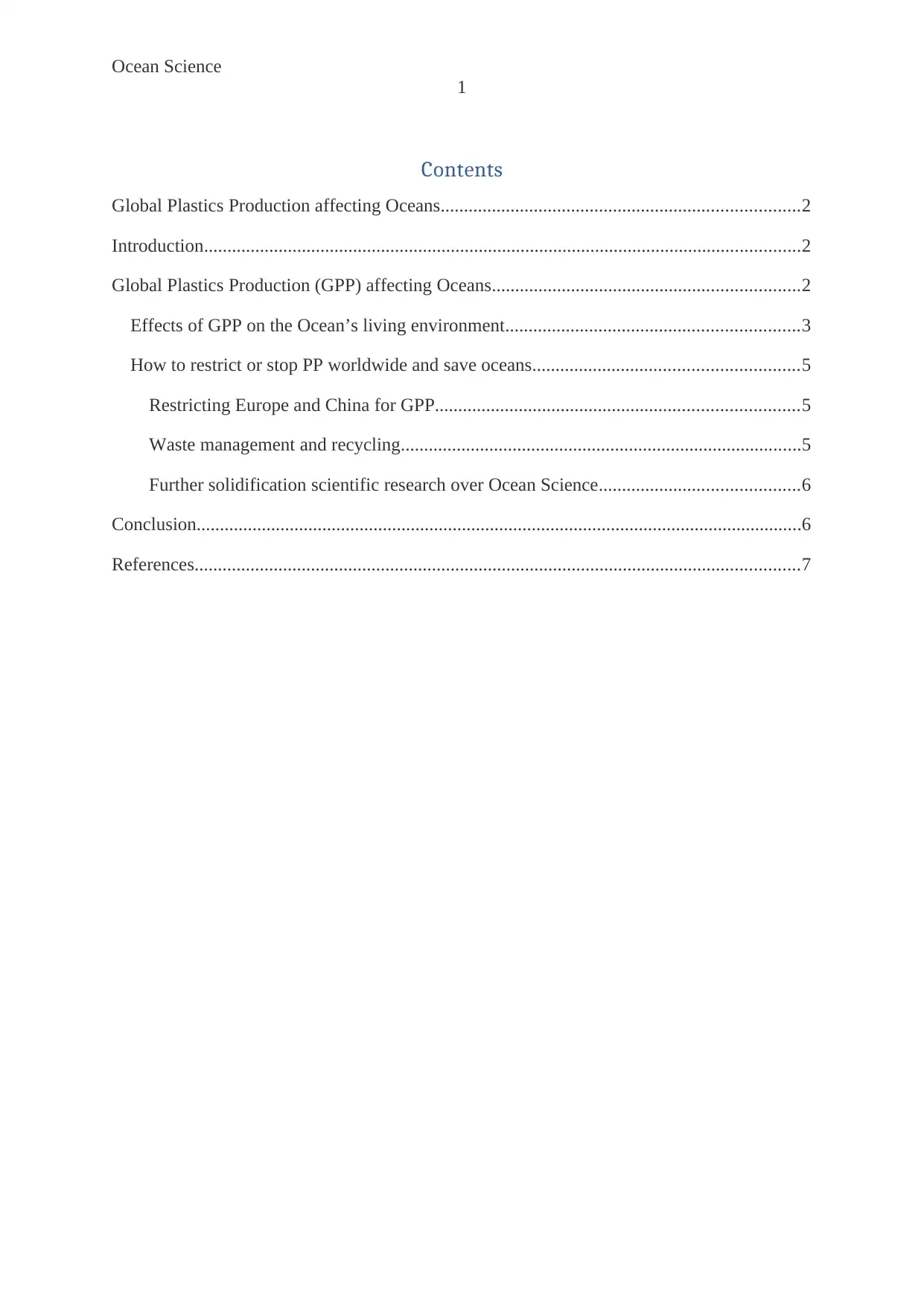
Ocean Science
1
Contents
Global Plastics Production affecting Oceans.............................................................................2
Introduction................................................................................................................................2
Global Plastics Production (GPP) affecting Oceans..................................................................2
Effects of GPP on the Ocean’s living environment...............................................................3
How to restrict or stop PP worldwide and save oceans.........................................................5
Restricting Europe and China for GPP..............................................................................5
Waste management and recycling......................................................................................5
Further solidification scientific research over Ocean Science...........................................6
Conclusion..................................................................................................................................6
References..................................................................................................................................7
1
Contents
Global Plastics Production affecting Oceans.............................................................................2
Introduction................................................................................................................................2
Global Plastics Production (GPP) affecting Oceans..................................................................2
Effects of GPP on the Ocean’s living environment...............................................................3
How to restrict or stop PP worldwide and save oceans.........................................................5
Restricting Europe and China for GPP..............................................................................5
Waste management and recycling......................................................................................5
Further solidification scientific research over Ocean Science...........................................6
Conclusion..................................................................................................................................6
References..................................................................................................................................7
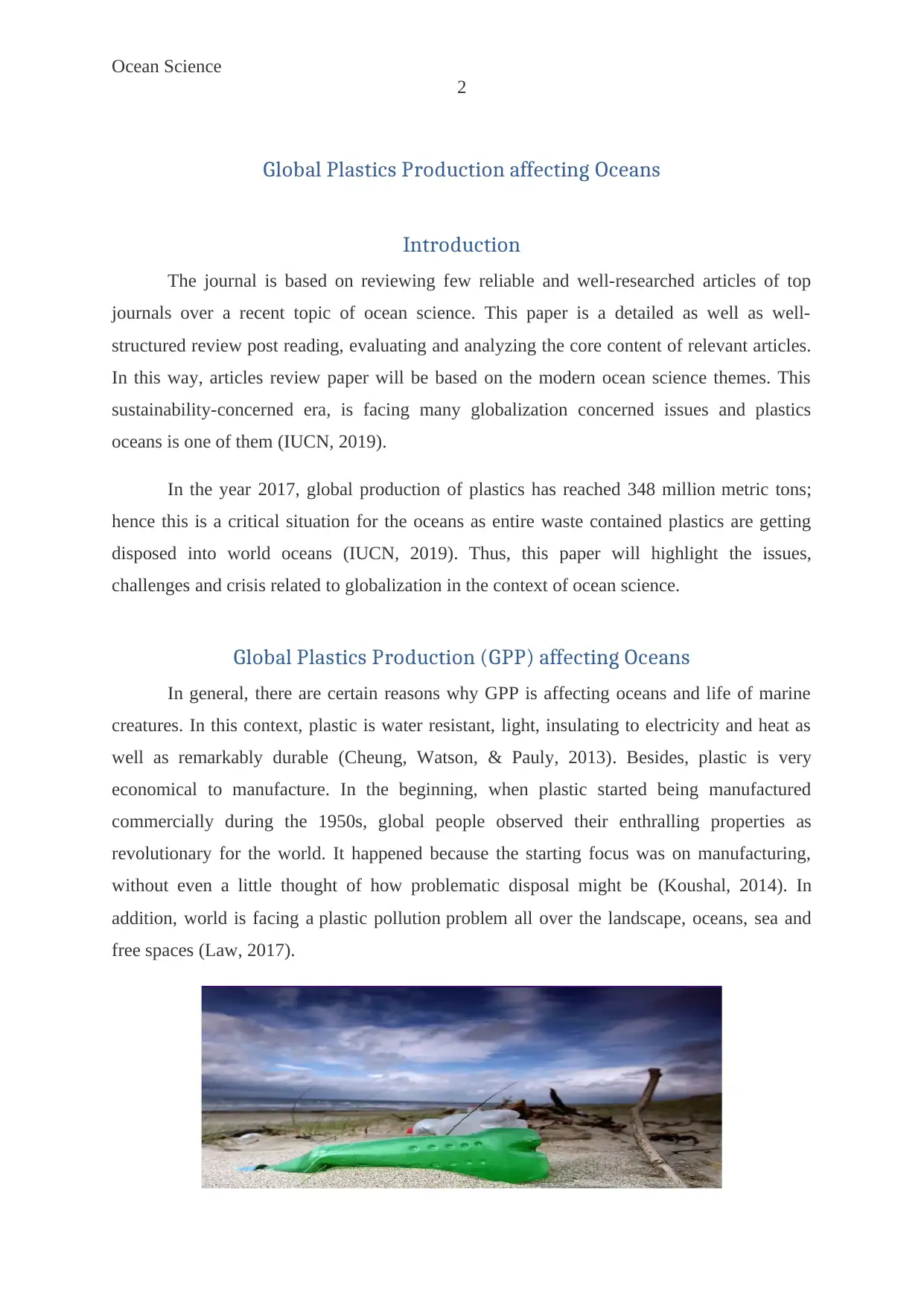
Ocean Science
2
Global Plastics Production affecting Oceans
Introduction
The journal is based on reviewing few reliable and well-researched articles of top
journals over a recent topic of ocean science. This paper is a detailed as well as well-
structured review post reading, evaluating and analyzing the core content of relevant articles.
In this way, articles review paper will be based on the modern ocean science themes. This
sustainability-concerned era, is facing many globalization concerned issues and plastics
oceans is one of them (IUCN, 2019).
In the year 2017, global production of plastics has reached 348 million metric tons;
hence this is a critical situation for the oceans as entire waste contained plastics are getting
disposed into world oceans (IUCN, 2019). Thus, this paper will highlight the issues,
challenges and crisis related to globalization in the context of ocean science.
Global Plastics Production (GPP) affecting Oceans
In general, there are certain reasons why GPP is affecting oceans and life of marine
creatures. In this context, plastic is water resistant, light, insulating to electricity and heat as
well as remarkably durable (Cheung, Watson, & Pauly, 2013). Besides, plastic is very
economical to manufacture. In the beginning, when plastic started being manufactured
commercially during the 1950s, global people observed their enthralling properties as
revolutionary for the world. It happened because the starting focus was on manufacturing,
without even a little thought of how problematic disposal might be (Koushal, 2014). In
addition, world is facing a plastic pollution problem all over the landscape, oceans, sea and
free spaces (Law, 2017).
2
Global Plastics Production affecting Oceans
Introduction
The journal is based on reviewing few reliable and well-researched articles of top
journals over a recent topic of ocean science. This paper is a detailed as well as well-
structured review post reading, evaluating and analyzing the core content of relevant articles.
In this way, articles review paper will be based on the modern ocean science themes. This
sustainability-concerned era, is facing many globalization concerned issues and plastics
oceans is one of them (IUCN, 2019).
In the year 2017, global production of plastics has reached 348 million metric tons;
hence this is a critical situation for the oceans as entire waste contained plastics are getting
disposed into world oceans (IUCN, 2019). Thus, this paper will highlight the issues,
challenges and crisis related to globalization in the context of ocean science.
Global Plastics Production (GPP) affecting Oceans
In general, there are certain reasons why GPP is affecting oceans and life of marine
creatures. In this context, plastic is water resistant, light, insulating to electricity and heat as
well as remarkably durable (Cheung, Watson, & Pauly, 2013). Besides, plastic is very
economical to manufacture. In the beginning, when plastic started being manufactured
commercially during the 1950s, global people observed their enthralling properties as
revolutionary for the world. It happened because the starting focus was on manufacturing,
without even a little thought of how problematic disposal might be (Koushal, 2014). In
addition, world is facing a plastic pollution problem all over the landscape, oceans, sea and
free spaces (Law, 2017).
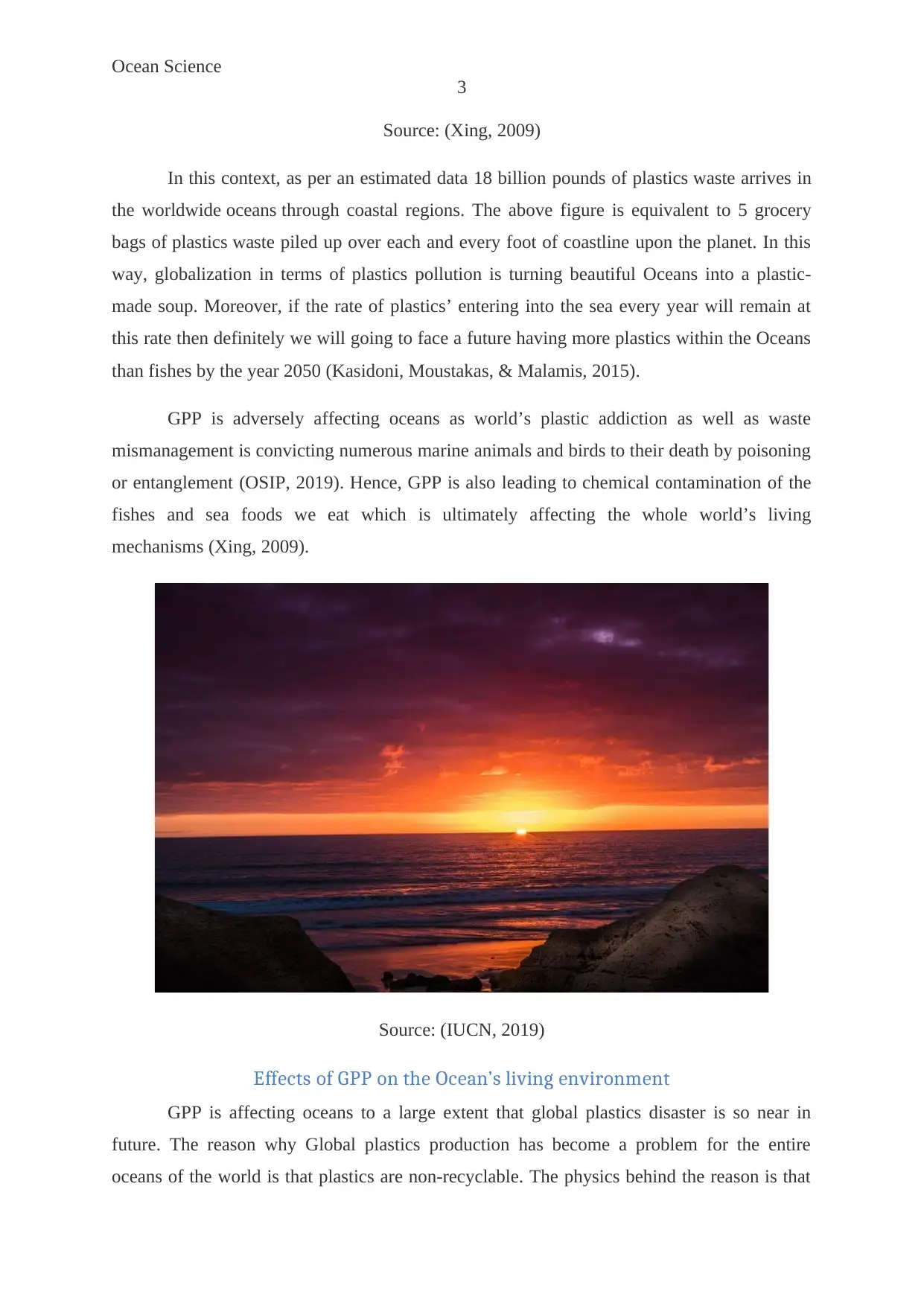
Ocean Science
3
Source: (Xing, 2009)
In this context, as per an estimated data 18 billion pounds of plastics waste arrives in
the worldwide oceans through coastal regions. The above figure is equivalent to 5 grocery
bags of plastics waste piled up over each and every foot of coastline upon the planet. In this
way, globalization in terms of plastics pollution is turning beautiful Oceans into a plastic-
made soup. Moreover, if the rate of plastics’ entering into the sea every year will remain at
this rate then definitely we will going to face a future having more plastics within the Oceans
than fishes by the year 2050 (Kasidoni, Moustakas, & Malamis, 2015).
GPP is adversely affecting oceans as world’s plastic addiction as well as waste
mismanagement is convicting numerous marine animals and birds to their death by poisoning
or entanglement (OSIP, 2019). Hence, GPP is also leading to chemical contamination of the
fishes and sea foods we eat which is ultimately affecting the whole world’s living
mechanisms (Xing, 2009).
Source: (IUCN, 2019)
Effects of GPP on the Ocean’s living environment
GPP is affecting oceans to a large extent that global plastics disaster is so near in
future. The reason why Global plastics production has become a problem for the entire
oceans of the world is that plastics are non-recyclable. The physics behind the reason is that
3
Source: (Xing, 2009)
In this context, as per an estimated data 18 billion pounds of plastics waste arrives in
the worldwide oceans through coastal regions. The above figure is equivalent to 5 grocery
bags of plastics waste piled up over each and every foot of coastline upon the planet. In this
way, globalization in terms of plastics pollution is turning beautiful Oceans into a plastic-
made soup. Moreover, if the rate of plastics’ entering into the sea every year will remain at
this rate then definitely we will going to face a future having more plastics within the Oceans
than fishes by the year 2050 (Kasidoni, Moustakas, & Malamis, 2015).
GPP is adversely affecting oceans as world’s plastic addiction as well as waste
mismanagement is convicting numerous marine animals and birds to their death by poisoning
or entanglement (OSIP, 2019). Hence, GPP is also leading to chemical contamination of the
fishes and sea foods we eat which is ultimately affecting the whole world’s living
mechanisms (Xing, 2009).
Source: (IUCN, 2019)
Effects of GPP on the Ocean’s living environment
GPP is affecting oceans to a large extent that global plastics disaster is so near in
future. The reason why Global plastics production has become a problem for the entire
oceans of the world is that plastics are non-recyclable. The physics behind the reason is that
Secure Best Marks with AI Grader
Need help grading? Try our AI Grader for instant feedback on your assignments.
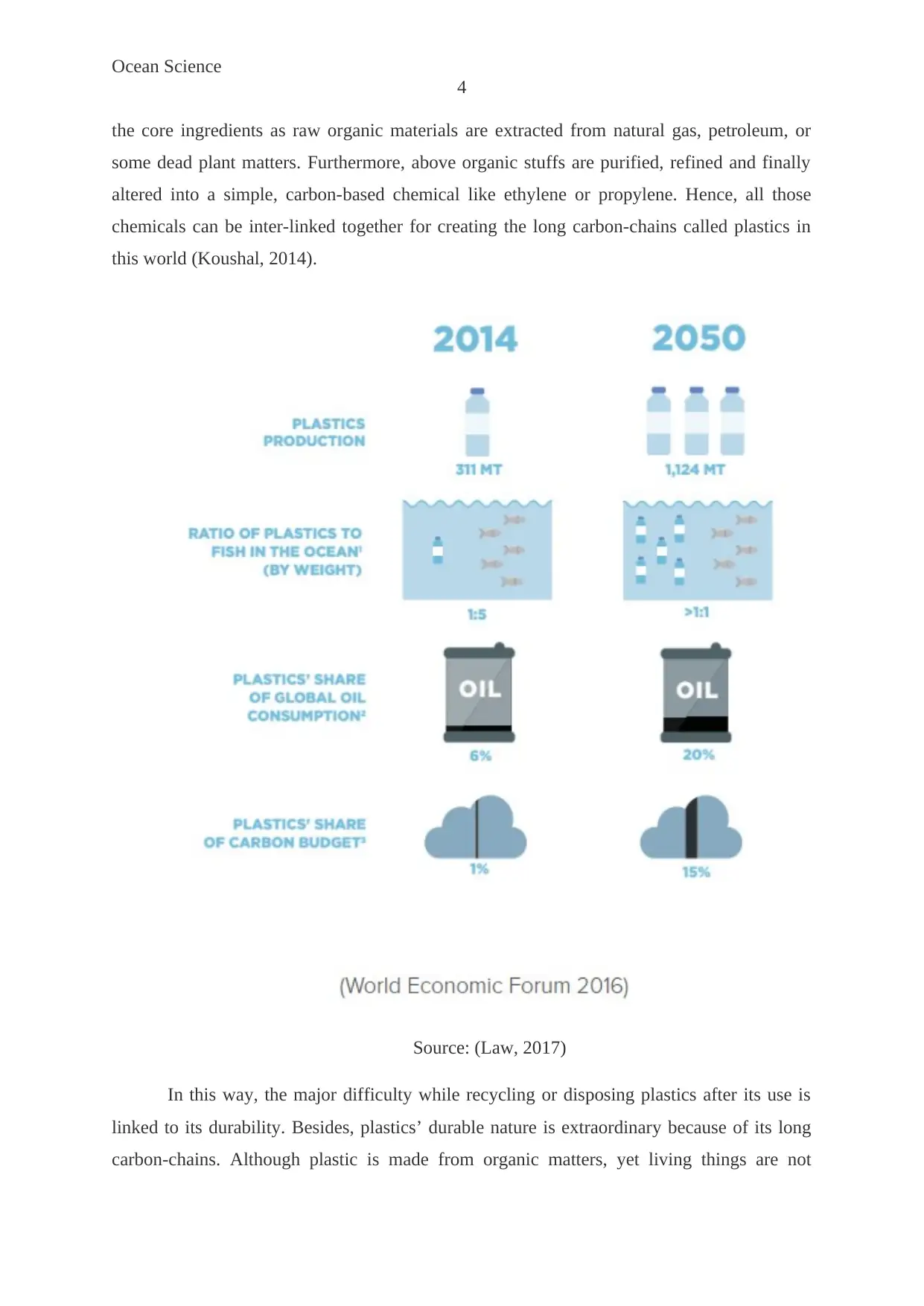
Ocean Science
4
the core ingredients as raw organic materials are extracted from natural gas, petroleum, or
some dead plant matters. Furthermore, above organic stuffs are purified, refined and finally
altered into a simple, carbon-based chemical like ethylene or propylene. Hence, all those
chemicals can be inter-linked together for creating the long carbon-chains called plastics in
this world (Koushal, 2014).
Source: (Law, 2017)
In this way, the major difficulty while recycling or disposing plastics after its use is
linked to its durability. Besides, plastics’ durable nature is extraordinary because of its long
carbon-chains. Although plastic is made from organic matters, yet living things are not
4
the core ingredients as raw organic materials are extracted from natural gas, petroleum, or
some dead plant matters. Furthermore, above organic stuffs are purified, refined and finally
altered into a simple, carbon-based chemical like ethylene or propylene. Hence, all those
chemicals can be inter-linked together for creating the long carbon-chains called plastics in
this world (Koushal, 2014).
Source: (Law, 2017)
In this way, the major difficulty while recycling or disposing plastics after its use is
linked to its durability. Besides, plastics’ durable nature is extraordinary because of its long
carbon-chains. Although plastic is made from organic matters, yet living things are not
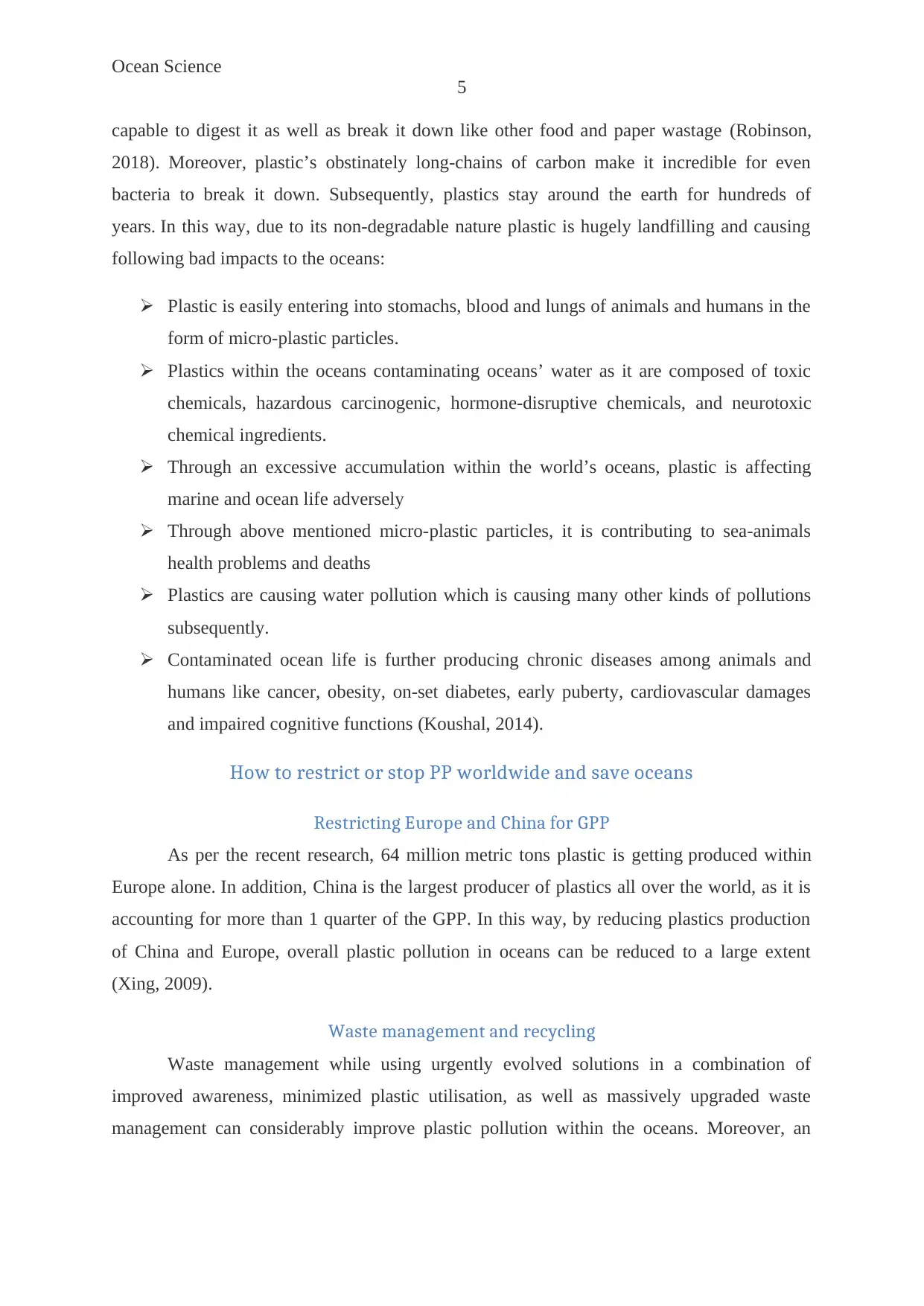
Ocean Science
5
capable to digest it as well as break it down like other food and paper wastage (Robinson,
2018). Moreover, plastic’s obstinately long-chains of carbon make it incredible for even
bacteria to break it down. Subsequently, plastics stay around the earth for hundreds of
years. In this way, due to its non-degradable nature plastic is hugely landfilling and causing
following bad impacts to the oceans:
Plastic is easily entering into stomachs, blood and lungs of animals and humans in the
form of micro-plastic particles.
Plastics within the oceans contaminating oceans’ water as it are composed of toxic
chemicals, hazardous carcinogenic, hormone-disruptive chemicals, and neurotoxic
chemical ingredients.
Through an excessive accumulation within the world’s oceans, plastic is affecting
marine and ocean life adversely
Through above mentioned micro-plastic particles, it is contributing to sea-animals
health problems and deaths
Plastics are causing water pollution which is causing many other kinds of pollutions
subsequently.
Contaminated ocean life is further producing chronic diseases among animals and
humans like cancer, obesity, on-set diabetes, early puberty, cardiovascular damages
and impaired cognitive functions (Koushal, 2014).
How to restrict or stop PP worldwide and save oceans
Restricting Europe and China for GPP
As per the recent research, 64 million metric tons plastic is getting produced within
Europe alone. In addition, China is the largest producer of plastics all over the world, as it is
accounting for more than 1 quarter of the GPP. In this way, by reducing plastics production
of China and Europe, overall plastic pollution in oceans can be reduced to a large extent
(Xing, 2009).
Waste management and recycling
Waste management while using urgently evolved solutions in a combination of
improved awareness, minimized plastic utilisation, as well as massively upgraded waste
management can considerably improve plastic pollution within the oceans. Moreover, an
5
capable to digest it as well as break it down like other food and paper wastage (Robinson,
2018). Moreover, plastic’s obstinately long-chains of carbon make it incredible for even
bacteria to break it down. Subsequently, plastics stay around the earth for hundreds of
years. In this way, due to its non-degradable nature plastic is hugely landfilling and causing
following bad impacts to the oceans:
Plastic is easily entering into stomachs, blood and lungs of animals and humans in the
form of micro-plastic particles.
Plastics within the oceans contaminating oceans’ water as it are composed of toxic
chemicals, hazardous carcinogenic, hormone-disruptive chemicals, and neurotoxic
chemical ingredients.
Through an excessive accumulation within the world’s oceans, plastic is affecting
marine and ocean life adversely
Through above mentioned micro-plastic particles, it is contributing to sea-animals
health problems and deaths
Plastics are causing water pollution which is causing many other kinds of pollutions
subsequently.
Contaminated ocean life is further producing chronic diseases among animals and
humans like cancer, obesity, on-set diabetes, early puberty, cardiovascular damages
and impaired cognitive functions (Koushal, 2014).
How to restrict or stop PP worldwide and save oceans
Restricting Europe and China for GPP
As per the recent research, 64 million metric tons plastic is getting produced within
Europe alone. In addition, China is the largest producer of plastics all over the world, as it is
accounting for more than 1 quarter of the GPP. In this way, by reducing plastics production
of China and Europe, overall plastic pollution in oceans can be reduced to a large extent
(Xing, 2009).
Waste management and recycling
Waste management while using urgently evolved solutions in a combination of
improved awareness, minimized plastic utilisation, as well as massively upgraded waste
management can considerably improve plastic pollution within the oceans. Moreover, an
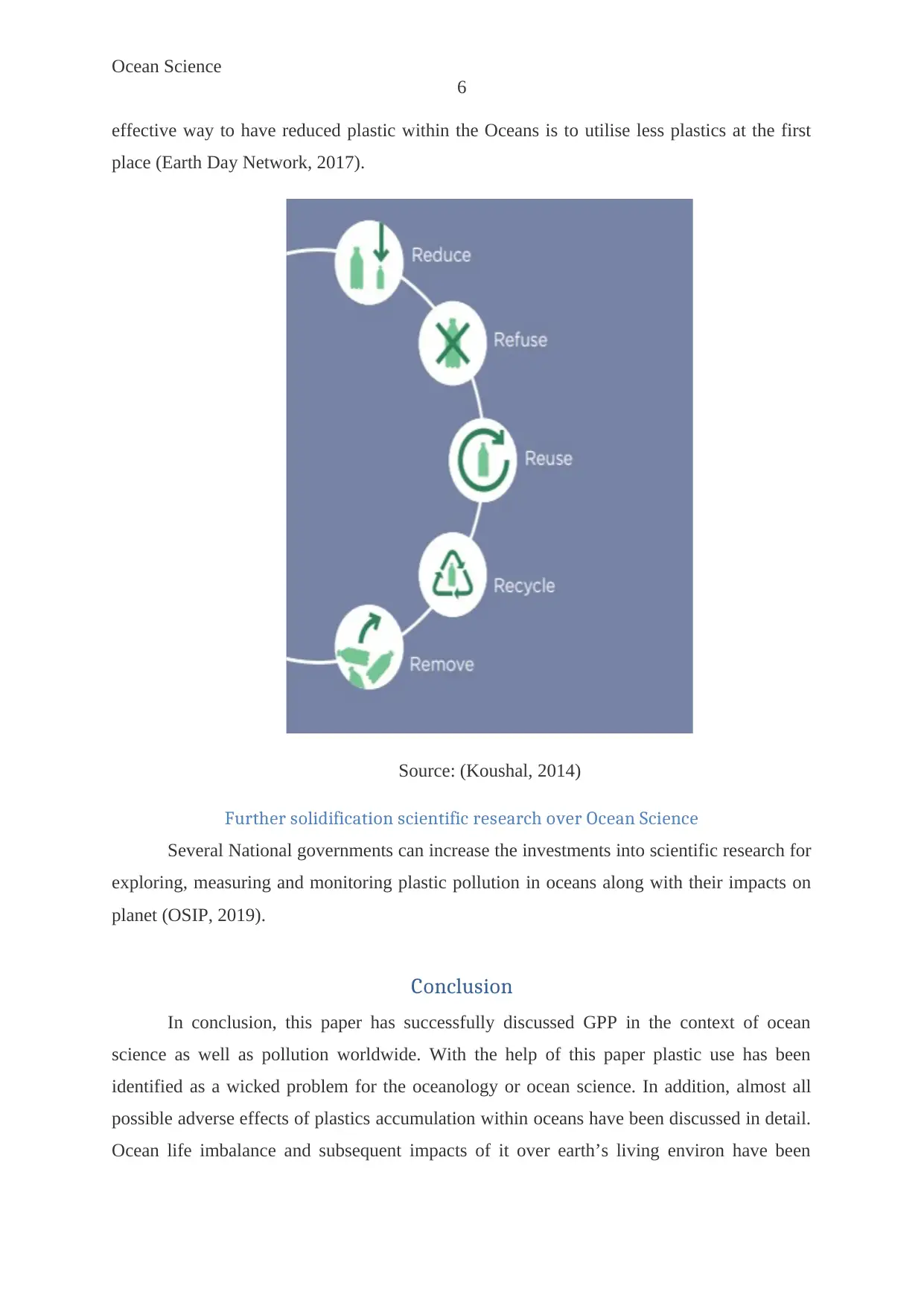
Ocean Science
6
effective way to have reduced plastic within the Oceans is to utilise less plastics at the first
place (Earth Day Network, 2017).
Source: (Koushal, 2014)
Further solidification scientific research over Ocean Science
Several National governments can increase the investments into scientific research for
exploring, measuring and monitoring plastic pollution in oceans along with their impacts on
planet (OSIP, 2019).
Conclusion
In conclusion, this paper has successfully discussed GPP in the context of ocean
science as well as pollution worldwide. With the help of this paper plastic use has been
identified as a wicked problem for the oceanology or ocean science. In addition, almost all
possible adverse effects of plastics accumulation within oceans have been discussed in detail.
Ocean life imbalance and subsequent impacts of it over earth’s living environ have been
6
effective way to have reduced plastic within the Oceans is to utilise less plastics at the first
place (Earth Day Network, 2017).
Source: (Koushal, 2014)
Further solidification scientific research over Ocean Science
Several National governments can increase the investments into scientific research for
exploring, measuring and monitoring plastic pollution in oceans along with their impacts on
planet (OSIP, 2019).
Conclusion
In conclusion, this paper has successfully discussed GPP in the context of ocean
science as well as pollution worldwide. With the help of this paper plastic use has been
identified as a wicked problem for the oceanology or ocean science. In addition, almost all
possible adverse effects of plastics accumulation within oceans have been discussed in detail.
Ocean life imbalance and subsequent impacts of it over earth’s living environ have been
Paraphrase This Document
Need a fresh take? Get an instant paraphrase of this document with our AI Paraphraser
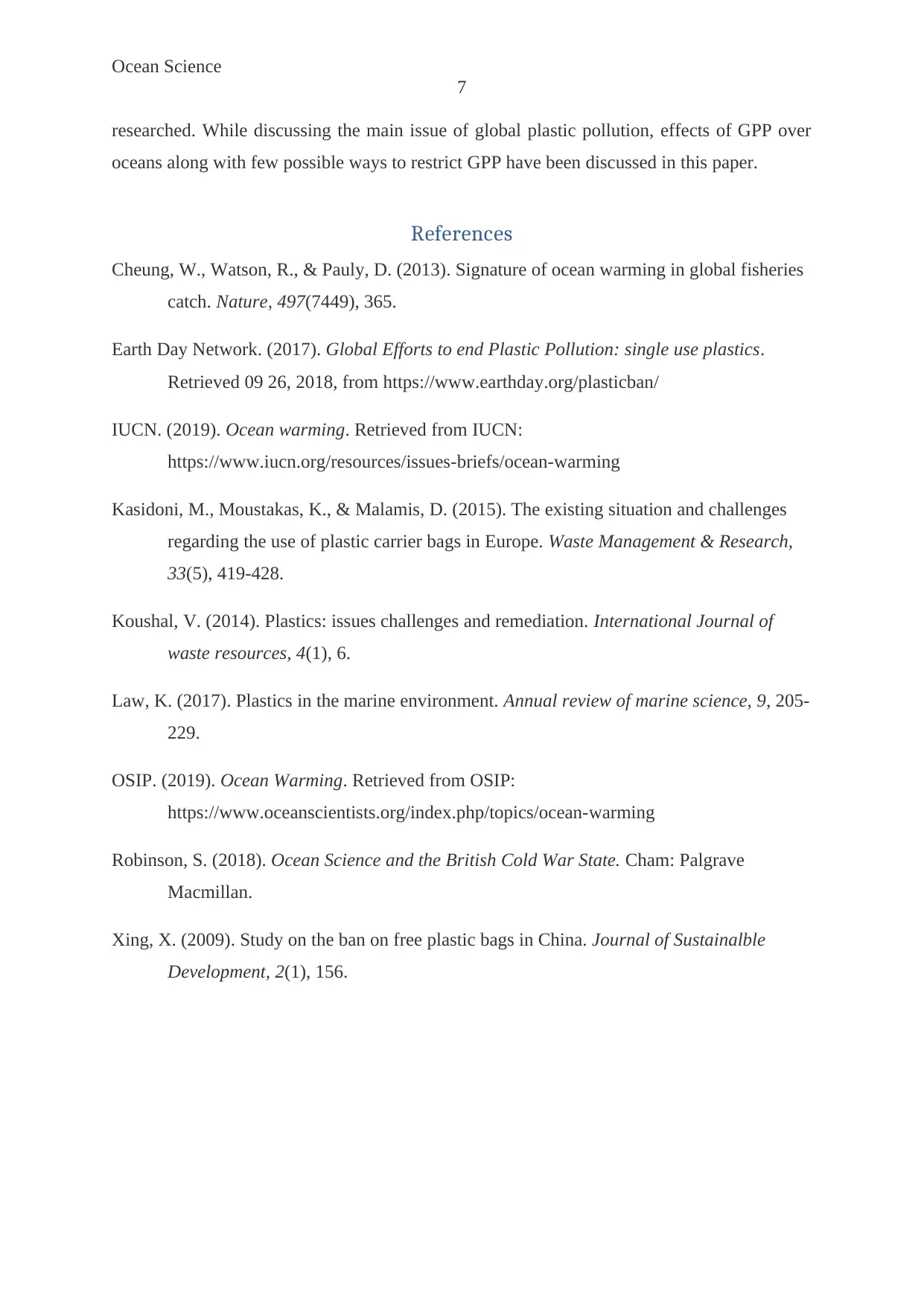
Ocean Science
7
researched. While discussing the main issue of global plastic pollution, effects of GPP over
oceans along with few possible ways to restrict GPP have been discussed in this paper.
References
Cheung, W., Watson, R., & Pauly, D. (2013). Signature of ocean warming in global fisheries
catch. Nature, 497(7449), 365.
Earth Day Network. (2017). Global Efforts to end Plastic Pollution: single use plastics.
Retrieved 09 26, 2018, from https://www.earthday.org/plasticban/
IUCN. (2019). Ocean warming. Retrieved from IUCN:
https://www.iucn.org/resources/issues-briefs/ocean-warming
Kasidoni, M., Moustakas, K., & Malamis, D. (2015). The existing situation and challenges
regarding the use of plastic carrier bags in Europe. Waste Management & Research,
33(5), 419-428.
Koushal, V. (2014). Plastics: issues challenges and remediation. International Journal of
waste resources, 4(1), 6.
Law, K. (2017). Plastics in the marine environment. Annual review of marine science, 9, 205-
229.
OSIP. (2019). Ocean Warming. Retrieved from OSIP:
https://www.oceanscientists.org/index.php/topics/ocean-warming
Robinson, S. (2018). Ocean Science and the British Cold War State. Cham: Palgrave
Macmillan.
Xing, X. (2009). Study on the ban on free plastic bags in China. Journal of Sustainalble
Development, 2(1), 156.
7
researched. While discussing the main issue of global plastic pollution, effects of GPP over
oceans along with few possible ways to restrict GPP have been discussed in this paper.
References
Cheung, W., Watson, R., & Pauly, D. (2013). Signature of ocean warming in global fisheries
catch. Nature, 497(7449), 365.
Earth Day Network. (2017). Global Efforts to end Plastic Pollution: single use plastics.
Retrieved 09 26, 2018, from https://www.earthday.org/plasticban/
IUCN. (2019). Ocean warming. Retrieved from IUCN:
https://www.iucn.org/resources/issues-briefs/ocean-warming
Kasidoni, M., Moustakas, K., & Malamis, D. (2015). The existing situation and challenges
regarding the use of plastic carrier bags in Europe. Waste Management & Research,
33(5), 419-428.
Koushal, V. (2014). Plastics: issues challenges and remediation. International Journal of
waste resources, 4(1), 6.
Law, K. (2017). Plastics in the marine environment. Annual review of marine science, 9, 205-
229.
OSIP. (2019). Ocean Warming. Retrieved from OSIP:
https://www.oceanscientists.org/index.php/topics/ocean-warming
Robinson, S. (2018). Ocean Science and the British Cold War State. Cham: Palgrave
Macmillan.
Xing, X. (2009). Study on the ban on free plastic bags in China. Journal of Sustainalble
Development, 2(1), 156.
1 out of 8
Related Documents
Your All-in-One AI-Powered Toolkit for Academic Success.
+13062052269
info@desklib.com
Available 24*7 on WhatsApp / Email
![[object Object]](/_next/static/media/star-bottom.7253800d.svg)
Unlock your academic potential
© 2024 | Zucol Services PVT LTD | All rights reserved.





